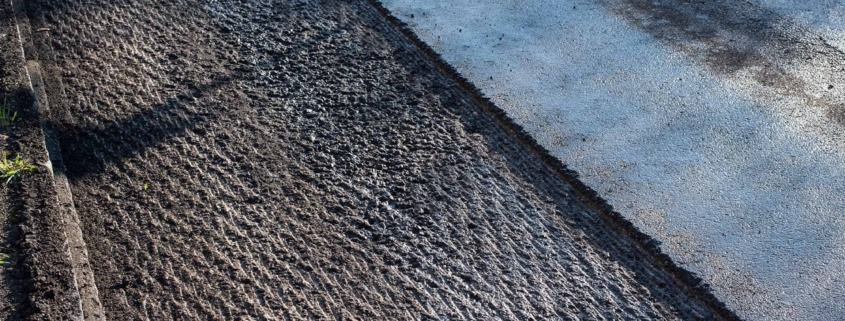The Role of Asphalt Milling in Pavement Repair
In this comprehensive guide, we delve into the critical aspect of road repair – asphalt milling. From understanding its basics to highlighting its applications and benefits in pavement repair, this piece stands as a fundamental resource for anyone seeking to grasp the intricate world of asphalt milling. Additionally, it sheds light on various considerations, including cost-effectiveness and environmental impact, that come into play within the asphalt milling process.
Understanding the Basics of Asphalt Milling
Asphalt milling is a vital process in maintaining and repairing paved surfaces. It involves the removal of part or all of the top layers of an asphalt surface, using a specialized machine called an asphalt milling machine. This process prepares the existing surface for a new layer of asphalt, ensuring a smooth and durable paved area.
With the use of modern technology and equipment, asphalt milling allows for the quick removal of old asphalt, making it a preferred method for pavement rejuvenation. It’s essential for managing defects and improving the overall condition of roads, parking lots, and other paved surfaces.
What Is Asphalt Milling?
At its core, asphalt milling is the process of grinding down the existing asphalt to a specified depth. A milling machine, featuring a large rotating drum fitted with cutting teeth, scrapes off the top layer of the asphalt. The milled surface is then collected into a dump truck or conveyed away for recycling or disposal.
This process can vary from micro milling, which removes a very thin layer, to full-depth milling where the entire asphalt layer is removed. The choice depends on the intended project and the condition of the existing pavement.
The Science Behind Asphalt Milling
The working principle behind asphalt milling revolves around the milling drum equipped with cutting teeth. As the drum rotates, these teeth hit the asphalt surface, effectively grinding it into smaller pieces. The drum’s design ensures consistent asphalt grinding depth and quality of the milling surface.
The milled material is then moved to the center of the machine by the conveyor system, where it’s transported to a dump truck or holding area. This precise operation allows for effective removal of the existing surface while preparing it for further asphalt paving or treatments.
Applications and Benefits of Asphalt Milling in Pavement Repair
Applications of Asphalt Milling in Pavement Repair
Asphalt milling serves various purposes in pavement repair and maintenance. Some common applications include:
Correcting pavement distortions like rutting, bumps, and surface irregularities.
Preparing the existing surface for a new overlay, enhancing the pavement’s lifespan.
Removing damaged sections due to heavy traffic, weather, or accidents for localized repairs.
Improving drainage and leveling by milling at specific slopes and grades.
Whether it’s a major highway, a busy parking lot, or residential roads, asphalt milling is a versatile solution for numerous pavement distress scenarios.
Advantages of Asphalt Milling: A Game-Changer in Road Repairs
The use of asphalt milling in pavement repair offers several key benefits, transforming how road repairs are approached:
- Cost-Effectiveness: Asphalt milling reduces the need for new materials by recycling milled asphalt, saving on costs and resources.
- Environmental Sustainability: Reusing milled asphalt minimizes waste and the carbon footprint involved in sourcing new asphalt, making it an eco-friendlier option.
- Reduced Construction Time: Milling is considerably faster than traditional excavation, allowing for quicker project completions and minimized disruptions to traffic.
- Improved Surface Quality: It enables the new asphalt overlay to bond better with the existing surface, leading to a smoother and more durable pavement.
By addressing pavement issues efficiently and sustainably, asphalt milling signals a new era in roadway, parking lot, and pavement maintenance.
Need Road Repairs? Reach Out to Phillips
If you’re facing issues with your paved surfaces, Phillips Paving Company is here to assist. Our expertise in asphalt milling and pavement repair ensures that your roads, parking lots, or any paved surface get the attention they deserve. With state-of-the-art equipment and a team of experienced professionals, we provide solutions that are cost-effective, environmentally friendly, and durable. Contact us today to see how we can make your pavement problems a thing of the past.
Let’s TalkImportant Considerations in the Asphalt Milling Process
When it comes to preparing for a successful asphalt milling project, some key factors need consideration. Asphalt milling, a vital process in pavement repair, demands thorough planning and understanding. This involves removing the top layer of existing asphalt to create a smooth base for new paving. The equipment needed, from milling machines to dump trucks and skid steers, plays a critical role in the quality of the milled surface. Moreover, the deep understanding of the existing pavement condition, the types of asphalt millings, and the desired finished surface are among the top considerations for a successful milling project.
Furthermore, the operational aspects, like the pattern of milling and the depth of asphalt removal, significantly impact the final paved surface. Properly managing the removal of existing asphalt and ensuring its disposal or recycling is another crucial aspect. These considerations ensure that the pavement milling process not only addresses pavement distress but also prepares the area effectively for subsequent road repairs or paving methods.
Given the technical nature of the process, accurately assessing the condition of the existing surface, including any underlying issues like improper drainage or base failure, is essential. This assessment guides the milling depth and technique, ensuring that only the problematic top layer is removed and the underlying structure remains intact. Selecting the right type of milling, whether standard or micro milling, depends on the project’s specific requirements and the desired surface smoothness. Making informed decisions in these areas can substantially affect the pavement’s longevity and performance.
Cost-Effectiveness of Asphalt Milling
Asphalt milling stands out as a cost-effective solution for maintaining paved areas. Unlike traditional repaving methods, milling only removes the surface layer, saving significant amounts on material costs. This efficient use of resources not only reduces the overall expenses but also shortens the project timeline, leading to less inconvenience for the public and businesses.
An important cost-saving aspect of asphalt milling is its ability to recycle the removed top layer. This recycled asphalt can be used in new paving projects or as a base material, further cutting down costs. By reusing the existing asphalt, the need for new materials is significantly reduced, translating into direct savings.
Additionally, the precision of asphalt milling machines allows for targeting specific areas of pavement distress, avoiding unnecessary removal of unaffected pavement. This selective process prevents wasteful expenditure on materials and labor, ensuring that resources are allocated efficiently. The streamlined process of asphalt milling, when properly executed, can lead to substantial cost savings without compromising quality.
Environmental Impact and Sustainability Concerns
The environmental benefits of asphalt milling contribute significantly to its adoption in modern paving practices. The process offers a greener alternative by allowing for the recycling of the existing asphalt, which reduces the demand for new asphalt production and lowers the carbon footprint associated with road construction and repair.
Asphalt milling also prevents the accumulation of old asphalt in landfills, contributing to waste reduction. The recyclability aspect is a key feature, with the milled asphalt often used in creating new paving materials or as a fill material, proving that sustainable practices can go hand in hand with cost-effective road maintenance.
Furthermore, using milled asphalt for paving projects conserves natural resources by decreasing the quarrying for new stones and the production of new asphalt. This conservation effort, combined with the reduced transportation needs since materials are often processed and used on-site or nearby with road grinding equipment, highlights asphalt milling as a sustainable paving option. Emphasizing these environmental impacts helps pave the way for more sustainable construction practices in the industry.
Solve Your Asphalt Needs With Phillips Paving Company
Phillips Paving Company brings its vast experience and commitment to quality into every asphalt milling project. Understanding the intricacies of the milling process, we ensure a cost-effective and environmentally friendly approach to pavement repair. Our expertise spans overcoming challenges such as selecting the right milling depth, ensuring proper compaction, and addressing any underlying issues of the existing pavement.
We pride ourselves on offering solutions that not only meet but exceed your expectations. From addressing heavy traffic areas with durable solutions to milling parking lots and roads, our asphalt milling services stand out for their attention to detail and dedication to sustainability. Whether you’re dealing with a small crack filling equipment need or a large-scale milling project, our team is equipped to handle it all.




